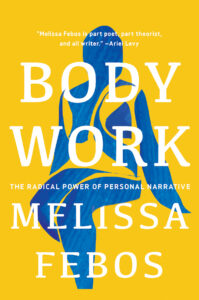In Body Work: The Radical Power of Personal Narrative, prolific essayist Melissa Febos, author of the memoir Whip Smart; Abandon Me; and the bestselling essay collection Girlhood, blends memoir with insight and guidance about the art of writing, primarily for an audience of memoirists.
 Why highlight a book about the craft of writing in a magazine for adoptees, donor conceived people, and others who’ve experienced misattributed parentage? What does it have to do with you?
Why highlight a book about the craft of writing in a magazine for adoptees, donor conceived people, and others who’ve experienced misattributed parentage? What does it have to do with you?
Possibly everything.
You needn’t be a writer to be inspired and educated by Body Work. The author’s razor-sharp insights are pertinent to anyone who wants to excavate their own truths; interrogate their traumas and their shame; and, especially, take ownership of their narratives.
To be adoptees or NPEs* means that part of our stories—the most foundational parts—were taken from us before we could ever know them. They were stolen for a host of reasons, but typically to keep others from facing uncomfortable truths—a theft that not only deflected shame from them but projected it onto us, suggesting that we are its source. Secrets were kept from us, and our stories were rewritten to better fit others’ narratives and preserve their integrity at the expense of our own. Our stories may be hidden behind closed doors, guarded by gatekeepers who insist we have no right to try to open them. If we persist and manage to unlock the doors, those for whom secrecy was in their best interest may tell us that what we discover is not ours to share. Sometimes we tell ourselves these lies.
Right out of the gate, Febos blows up any responsibility we might feel to hold tight to our stories and privately tend our traumas, and she positions storytelling as a strategy of reclamation. “Writing,” she says, “is a form of freedom more accessible than many and there are forces at work in our society that would like to withhold it from those whose stories threaten the regimes that govern this society.”
In those words it’s easy to see the adoptee/NPE world as a microcosm of that larger society—in which the secret keepers who are threatened by our stories try to inhibit our voices. In this regard, her prescription is equally apt: “Fuck them. Write your life. Let this book be a totem of permission, encouragement, proof, whatever you need it to be.”
In literary criticism, the genre of memoir has been a durable punching bag, dismissed and derided—despite is popularity—as a vain and trivial exercise in “naval-gazing.” It’s a judgment that tells would-be storytellers their histories aren’t worthwhile and their traumas are unseemly—not for public consumption. Febos annihilates the argument and makes a compelling case that personal narrative can be healing to the teller at the same time it’s a balm for readers. Writing, she says, “has become for me a primary means of digesting and integrating my experiences and thereby reducing the pains of living, or if not, at least making them useful to myself and to others. There is no pain in my life that has not been given value by the alchemy of creative attention.”
She brilliantly explores what’s behind the dismissal of the form and, in particular, the admonition not to write about trauma, and turns the criticism on its head, asserting that writing about trauma is subversive and that resistance to the stories of oppressed people “is a resistance to justice.” Telling one’s story, Febos says, is, in fact, a requirement for recovery from trauma and for integrating the experience into one’s life.
To everyone who’s bought into this idea that trauma is a private matter not suitable to written expression, she’s emphatic: “Listen to me: It is not gauche to write about trauma. It is subversive. The stigma of victimhood is a time-worn tool of oppressive powers to gaslight the people they subjugate into believing that by naming their disempowerment they are being dramatic, whining, attention grabbing, or else beating a dead horse. By convincing us to police our own and each other’s stories, they have enlisted us in the project of our own continued disempowerment.”
Febos acknowledges secrets as the seed of almost all her writing and recognizes the power of untold secrets to imprison. She argues that writing can liberate us both from our fears about the subjects we hesitate to write about and form the isolation we feel about them, demonstrating to ourselves and readers that we’re not alone.
The third of the book’s four essay chapters, “A Big Shitty Party: Six Parables About Writing About Other People,” will be of special interest to many NPEs who wonder how to tell their stories when doing so may cause collateral damage. Febos asks who has the right to tell a story and offers perspective for how to look at the ethical issues that may arise when the narrative you have to share could upset or wound others.
Whether you wish to write to publish or to simply to bear witness and feel heard, there’s much in Body Work that will validate your aspirations and inform your process. Febos inspires and encourages and insists not only that personal narratives are valuable but also that creating and sharing them are imperative. If you’ve been shamed, made vulnerable, been traumatized, told that your story isn’t yours to tell, Body Work will speak to you.
*NPE: not parent expected, non-paternal event, non-paternity event
—BKJ




